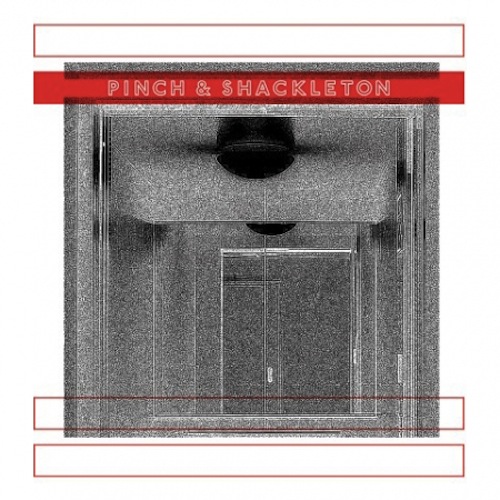It’s probably telling that my first experience with Berlin-based dubstep-ish (but sort of really techno-y) producer Shackleton was with last year’s Fabric 55 mix on which he assembled a number of his own spidery tracks into a challenging and harrowing 74 minutes. Despite being head of the now-defunct Skull Disco label and the very definition of the workingman producer, Fabric 55 and 09’s Three EPs are, by my calculations, his only documents clocking in at LP lengths. Shackleton has been around since ’04, content to keep us on a steady diet of 12-inches and compilations, transforming and lapping himself several times over. Yet we’re still waiting for on an official “Here’s Shackleton!” debut. So there’s some precedent to a full-length of original material from the guy, to say the very least. Even if it’s in collaboration.
Which brings us to Pinch. Pinch made some waves in ’07 with his first and only LP, the aptly titled Underwater Dancehall. But it’d be a lie to say he’s been MIA since then. Pinch and his label Tectonic are somewhat responsible for dubstep landing in Bristol, UK, and if Shackleton’s singles output has been a steady diet, then Pinch’s has been a feast. His collaboration with Shackleton will be his third release this year and that’s not including a mix for Resident Advisor he made back in February.
You get the sense both these guys are forever with their heads down, creating and redefining their artistry over and over again, willing to work rather than hustle. Both are on constantly traceable arcs, checking back in every couple of months with a couple bangers, stirring the pot in their respective locals, and then returning to the solitary glow of a laptop. So while Pinch & Shackleton should be a minor event of sorts, it’s hard not to feel like these guys are just momentarily crossing paths to drop a record on us and then go their separate ways. Especially since knowledge of the record’s existence seemed to go hand and hand with its release. From an outsider-looking-in perspective a lot of electronic music heavily indebted to their respective places on the map has this partial anonymity built into it, but it doesn’t make Pinch & Shackleton any less excellent. In fact, it’s perhaps all the more revelatory because of it.
The duo settles into an obvious groove on Pinch & Shackleton. The tracks are willing to ride along a gigantic low end, letting an expansive slowly-morphing negative space stretch out around the more immediate percussion and loops. On opener “Cracks In The Pleasuredome” a droning wall of synthesizers rises like a slowly awakened specter behind the singular throb of syncopated bass. The track settles into a staggering 2-step while cityscape synths stretch skyward before receding into blackness again. The contrast between resonate space and the more immediately tangible foundations is a constant theme on Pinch & Shackleton. It allows more immediate arrangement built into an ambient sense of sound and tempo like a cocoon of clouds wrapped around a pulsating city.
Pinch seems as much a moderator as a contributor. Shackleton’s work has always dabbled in techno’s more immediate and cerebral sense of detail and pace infused into his work, but here the tracks seem more concerned with their broader strokes and more passive subtleties, favoring atmosphere over endurance – melody over mathematics. It’s not as if it would have been hard to imagine these two artists’ respective pallets being totally comparable, but they certainly do have their respective pallets. Sometimes the notion of Pinch & Shackleton as a collaboration can be as joyfully immediate as, “hey look, Shackleton’s over there banging on those hand drums while Pinch is steadily pouring on the bass!” But the real surprise is how gracefully each song still exceeds the sum of its parts.
Tonally and aesthetically a lot here seems owed to Shackleton, but it’s seemingly within Pinch’s defter and sparser framework that many of Shackleton’s long-standing obsessions really come into their own. “Burning Blood” might be the best and most defined thing on the record and it’s a distillation of so much of what we’ve come to expect from Shackleton, yet without the producer’s seeming unwillingness to just ride something out for complete songs at a time. The track starts with a chunky indigenous percussion loop accompanied by an Asian horn sample before descending into hellish five-minute tribal ceremony. A growling bass drone cuts through the whole thing while furious hand drums rally beneath and ghostly synths swirl like smoke in the background. Shackleton’s fascinations with African and eastern world music come less in the form of a stray sample and more as a force of the overall atmosphere.
But it’s also important to note that Pinch & Shackleton is simply full of striking singular moments that keep things consistently wide-eyed, like the choral sample on “Leviathan” or the church organ on “Jellybones” or most of “Rooms Within a Room.” That Pinch & Shackleton surprises as much as it does is a testament to each producer’s relationship to UK bass and their seeming willingness to take “dubstep” onto their shoulders while simultaneously transcending it. In this context both Pinch and Shackleton are oddities in that their music isn’t strictly dance-oriented, but still belongs in clubs to be felt rather just than solely listened to on a pair of headphones. If IDM is more a frame of mind than a style of music, both Pinch and Shackleton can certainly lay claim to that approach. And Pinch & Shackleton stands as both artist’s most accessible and perhaps best work.

